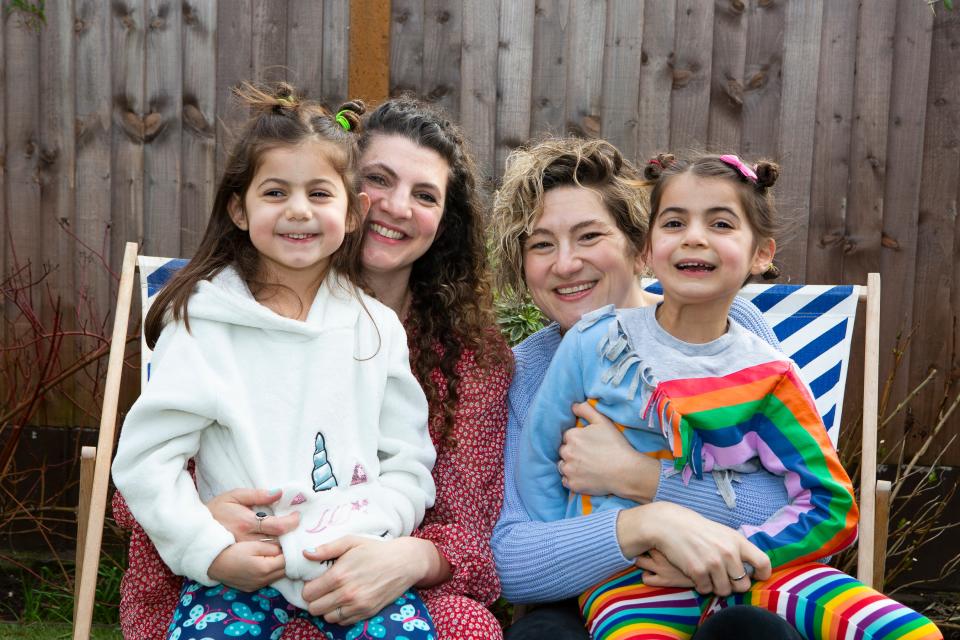My kids don’t see families that look like ours in books or on TV – this needs to change

When my young daughters began to realise that our two-mum family was different to other people’s, I immediately turned to books, assuming I would find an array of stories on offer that reflected our experience.
But, to my surprise, there was a real dearth of choice. Whilst a couple of classics existed, as well as one or two that focused specifically on the fact that all families are different, there was very little in the way of the vibrant, beautiful, funny, adventurous, modern stories (usually frontlist books from mainstream publishers) that my girls and I love.
When I looked around, I began to notice how glaring the lack of representation of families that look like mine is, right across our culture and media – be that in books, in film or on TV.
I wrote my debut picture book, The Pirate Mums, to try and counter this situation, because there are so many reasons it’s important that we all get to see a diverse range of families.
The book centres around a little boy called Billy who just wishes his family was a bit more like everyone else’s. The adult reader is likely to assume this is because Billy has two mums, but as the story unfolds we see, in fact, it’s because they’re pirates. It takes his parents saving the day on a school trip to the beach (with an ill-fated boat ride included) for Billy’s embarrassment at their outlandish pirate clothes, penchant for singing sea shanties and fishy taste in house design to evolve into pride.
I believe books like this are crucial for children like mine who have two mums, or two dads. The problem with never seeing yourself in the stories you consume – whether that’s on the page or on screen – is that it gives the impression that people like you simply aren’t worth telling stories about.
I wanted to write a book that would help to shore up my girls’ identity, reflect their wonderful, loving family, and demonstrate that stories can and do star people just like them. But books like The Pirate Mums, and the rest of the recent small but hopeful crop of LGBTQ+ themed picture books (such as My Daddies, Nen and the Lonely Fisherman and Grandad’s Camper) are just as needed by straight people and their families.
Whilst my children obviously know that families with two mums and two dads exist, lots don’t because of the lack of representation I mention. I’ve experienced on a few occasions confusion from the kids of straight friends when they first realise that my daughters have two mums – cue much embarrassment from their right-thinking adults.
Simply having same-sex parents star in a book produced by an internationally respected global publisher grants us legitimacy. That can be reassuring in a world where kids like mine risk being told in the playground that their family isn’t valid, because other children don’t know that girls can marry girls (or boys can marry boys) or that they can have children.
I don’t think I will ever forget overhearing a little girl say to my daughter on a park playdate that she couldn’t be the “other mummy” in their game of “mummies and daddies” because, as far as she was concerned, there was no such thing.
That playground and playdate experience will resonate with many queer people, especially those of my age and older, who may have grown up assuming that marriage and children simply wasn’t a route available to them.
I’m not saying that everyone should aim for a life of kids and monogamy, nor do I assume that it’s something that everyone wants. But I do want everyone to know that it’s available to them.
As well as my girls being able to relate to the characters in The Pirate Mums, I hope that children who discover later in life that they are queer might remember reading it, and understand that just because they won’t marry someone of the opposite sex, doesn’t mean they can’t have a family.
Inclusivity and representation of LGBTQ+ life in children’s culture does not need to be blunt. There is a definite place for books specifically about the fact that families come in all shapes and sizes, and which say outright that it’s ok to be different. But what I think we need more are brilliant, beautiful stories, where characters are simply who they are, and where the fact they are not straight is incidental.
The younger our children are when we show them that love is love and that all families are equal, the more effective those lessons will be in helping to create a more accepting world.
Jodie Lancet-Grant is the author of ‘The Pirate Mums’, published by Oxford University Press
Read More
In the end, there will be an appalling price paid for the war on the BBC
England’s players are performing a valuable service in taking the knee

 Yahoo Finance
Yahoo Finance 